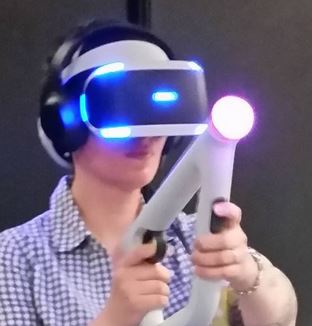
I attended my first dedicated games convention recently – the Develop: Brighton expo. I continually head to other ‘sub cultural’ events, such as London Comic Con, Hyper Japan and a few other events dotted around. I’m never sure what I expect from these, but always manage to be a little disappointed. I even began inching towards the cosplay world, suspecting that cosplay at these events is a bit like being in the kitchen at house parties, that’s where the real event happens. So far so meh.
I went to Develop: Brighton with few expectations and even fewer goals, but left with a lot of inspiration, a lot of business cards and a warm fuzzy feeling (but I was getting over the flu, so who knows what was really going on). Most of the exhibitors were developers of the indy persuasion and for such a seemingly small event, their breadth of originality and variety was great. I gravitated towards the talking-thinky variety of game, as is my wont.
There were certainly a lot of interesting exhibits at Develop, specifically Tom Battey’s collaboration with the British Library to create an interactive Shakespearean experience for schools, and intriguing experiences such as my first go at VR in Farpoint, a FPS which felt like a cheap and cheerful Halo knock off. But the highlights were easily Fragments of Him for its intelligent, mature depiction of lives and time, and the atmosphere of Develop which was one of genuine curiosity. For a lot more discussion on the games I sampled, head over to the podcast The Conversation Tree.
Fragments of Him is about the reactions of three different people who were defining influences on a young man killed suddenly at the start of the game. You, the player, ghost through their memories, interacting with them or key objects when prompted, which trigger their memories for you to watch and listen to. It’s getting good reviews from bloggers and opinion pieces, such as Alegra Frank’s article in Polygon, which considers the game in relation to grief and the healing process. One of the things that art strives to do is create a space for people to project their own meaning and digest privately. Fragments of Him certainly does that. I’m about a third of the way through the game and haven’t suffered a bereavement recently, so the tones of grief weren’t what resonated most for me. Instead, I was struck by the game’s contemplation of identity, specifically, gender identity. From the flashbacks we witness in the game, we see characters actively developing their sexuality and gender identity free from a developer’s judgement or even expectations. Judgement certainly exists within the game, one character frequently uses the word ‘normal’ to define intangible barriers, but the game as a device does not judge, does not force the player to judge. That’s what touched me most – there isn’t a right or wrong, a good or bad. There’s just life, and we all know what a mess that is.
